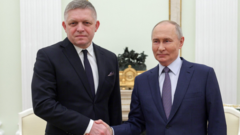As the world prepares for COP29 in Baku, observers are faced with the irony of an oil-rich, authoritarian nation leading climate negotiations amid rising environmental crises.**
COP29 in the Spotlight: The Paradox of Azerbaijan as Host for Climate Talks**

COP29 in the Spotlight: The Paradox of Azerbaijan as Host for Climate Talks**
Azerbaijan's reliance on fossil fuels and its autocratic governance raise questions about its role in global climate discussions.**
As the United Nations climate conference, COP29, approaches in Baku, Azerbaijan, the global community is confronted with the complexities of hosting climate negotiations in a nation whose economy is predominantly driven by fossil fuels. This paradox draws attention to the significant tension between environmental objectives and the geopolitical landscape.
Azerbaijan's economic structure relies almost entirely on oil and gas, resources that are sharply criticized for contributing to climate change. The question arises: how did this petrostate become the venue for such a crucial climate dialogue? The answer lies within the United Nations' procedural protocols, which allowed for manipulation by autocratic states, specifically Russia.
Traditionally, the U.N. climate summit rotates hosting responsibilities among different world regions each year. For this year's negotiations, the Eastern European group of nations, which includes former Soviet states, was tasked with nominating a host. However, after a tumultuous selection process rife with political dissent, Russia vetoed every candidate previously considered, retaliating against nations that had openly opposed its actions in Ukraine, such as Bulgaria, Slovenia, and Moldova.
As alternatives dwindled, Azerbaijan and its neighbor Armenia emerged as the only realistic choices despite their own historical conflicts. The debate over selection turned contentious, encapsulating present-day geopolitical tensions among post-Soviet nations while raising eyebrows internationally. Now, as COP29 kicks off, attendees must grapple with the implications of conducting climate negotiations under the aegis of a country entrenched in fossil fuel dependency and authoritarian rule.
While the global climate crisis reaches critical levels, the irony remains glaring: a nation propelled by the heavy weight of fossil fuel production is simultaneously stepping into the spotlight to lead discussions aimed at combatting climate change. The juxtaposition serves as a poignant reminder of the complexities facing international climate policy.





















